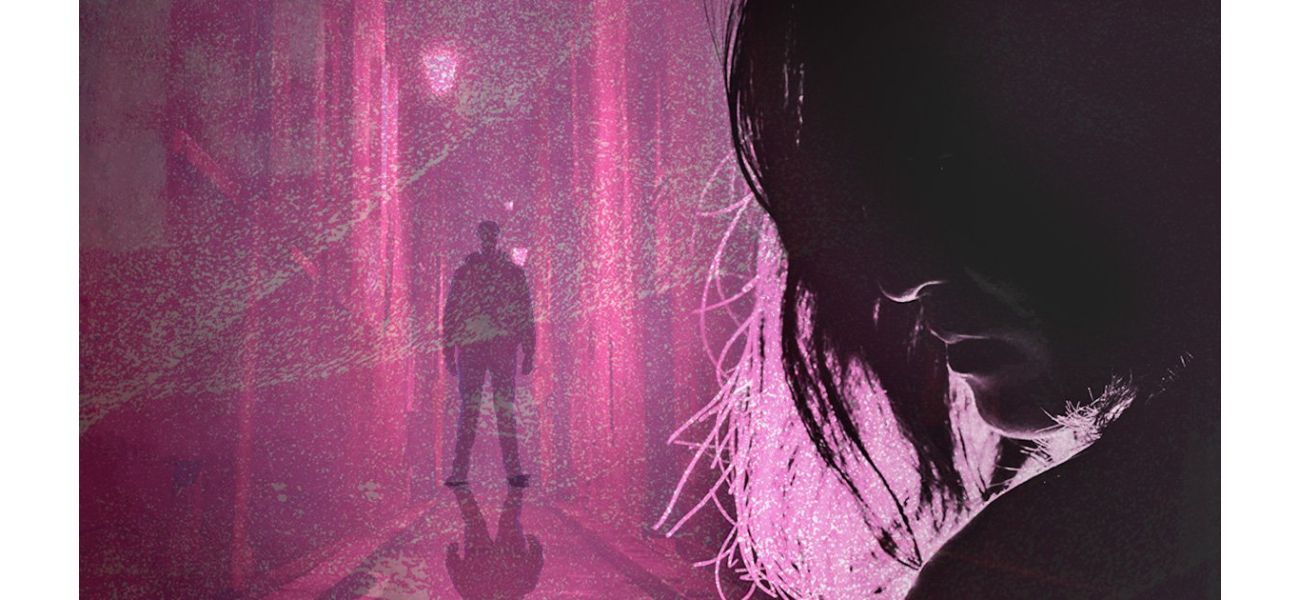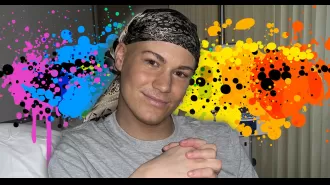Many women have rape fantasies, but the reason why remains a mystery.
The numbers are surprising at first glance.
October 22nd 2024.

Did you know that rape fantasies are actually quite common among women? It may sound shocking at first, but it's true. In fact, a recent study found that nearly two thirds of women have had fantasies about being raped. This may seem surprising, but it's important to understand that these fantasies have nothing to do with the actual crime of rape.
If you take a look through Gillian Anderson's new book Want, you'll see that the idea of being forced to have sex can actually be a turn on for some women – even though they may never want to experience it in real life. This book, much like Nancy Friday's My Secret Garden did 50 years ago, aims to normalize and bring to light the secret fantasies that many women have.
But even the women who shared their rape fantasies in Want question why they have them. After all, it goes against their own beliefs and values – so how could something as traumatic as rape ever be considered sexy? This is a question that has been debated and discussed for years, with no clear answer.
Trigger warning: the following contains explicit details of extreme fantasies that involve sexual assault
In Want, one woman shares how she gets turned on by the thought of a group of men breaking into her house and having their way with her. She acknowledges that this fantasy goes against many of the things she believes in, and it used to make her feel guilty. Another fantasy comes from a single woman in Finland who masturbates to the idea of being held captive by bikers and being forced to perform oral sex on all of them. These fantasies may seem shocking and disturbing, but it's important to remember that they are just that – fantasies. They are not a reflection of the women's desires or beliefs in real life.
It's crucial to reiterate that women who have rape fantasies do not actually want to be raped, nor do they condone it in any way. It's important to make this distinction, as many Hollywood films have been criticized for glorifying rape. However, Anderson's Want does the opposite by creating a safe and non-judgmental space for women to share and explore their fantasies.
It's also worth noting that there are two types of rape fantasies – those that cause erotic feelings and those that cause feelings of aversion. While some women may find these fantasies arousing, they can also be extremely distressing. It's important for individuals to understand and process their fantasies in a safe and healthy way.
Ultimately, it's crucial to remember that these fantasies are completely in the imaginations of those having them. They are consenting to what is happening in their heads, even if the situation they are imagining takes away their choice. Women who have rape fantasies are not condoning or excusing the act of rape, and they should not be judged or shamed for their thoughts. Instead, we should strive to create a safe and open dialogue about these fantasies and continue to explore and understand them.
According to a recent study, it is estimated that nearly two thirds of women have had fantasies about being raped. This may come as a shock to some, but as you delve into Gillian Anderson's new book, Want, you will discover that the idea of being forced to have sex can be a turn on for some women, even though it is something they would never want to experience in real life.
Similar to Nancy Friday's collection, My Secret Garden, which was published 50 years ago, Want contains the sexual desires of numerous women from all over the world. It aims to normalize thoughts and desires that are often kept secret. However, even some of the women who shared their rape fantasies in the book questioned why they were turned on by the idea, as it goes against their own beliefs and values. How can something as horrific as rape ever be considered sexy?
Trigger warning: the following paragraphs contain explicit details of extreme fantasies that involve sexual assault.
One woman, a married, bisexual Jewish woman, shared how she fantasizes about a group of men breaking into her house, covering her mouth, and taking turns having sex with her. She admits that this fantasy goes against many of the things she believes in, and she used to feel guilty about it. Another woman from Finland shared a similar fantasy where she is held captive by a group of bikers who strip her naked and force her to perform oral sex on each of them as punishment for trying to escape. Despite the extreme nature of these fantasies, they are solely in the imaginations of those having them and do not reflect their true desires or beliefs.
It is important to reiterate that women who have rape fantasies do not actually want to be raped, nor do they condone it in any way. These fantasies are a safe way for women to explore and unpack their desires, and should not be equated with wanting or justifying real-life sexual violence. In fact, Anderson's book creates a safe space for women to share their fantasies without fear of judgement.
Psychosexual therapist Ness Cooper explains that there are two types of rape fantasies - those that elicit erotic feelings and those that cause feelings of aversion. While these fantasies may be arousing to some, they can also be extremely distressing. Our brains have the ability to differentiate between erotic actions that we enjoy and those that we do not, which is why some people can accept rape fantasies as just that - fantasies and nothing more.
It is worth noting that these fantasies are completely within the control of those having them, and they are consenting to what is happening in their imagination. They are not wishing for or agreeing to real-life sexual violence. Want provides a platform for women to share their fantasies and be seen and understood, without judgement or criticism.
If you take a look through Gillian Anderson's new book Want, you'll see that the idea of being forced to have sex can actually be a turn on for some women – even though they may never want to experience it in real life. This book, much like Nancy Friday's My Secret Garden did 50 years ago, aims to normalize and bring to light the secret fantasies that many women have.
But even the women who shared their rape fantasies in Want question why they have them. After all, it goes against their own beliefs and values – so how could something as traumatic as rape ever be considered sexy? This is a question that has been debated and discussed for years, with no clear answer.
Trigger warning: the following contains explicit details of extreme fantasies that involve sexual assault
In Want, one woman shares how she gets turned on by the thought of a group of men breaking into her house and having their way with her. She acknowledges that this fantasy goes against many of the things she believes in, and it used to make her feel guilty. Another fantasy comes from a single woman in Finland who masturbates to the idea of being held captive by bikers and being forced to perform oral sex on all of them. These fantasies may seem shocking and disturbing, but it's important to remember that they are just that – fantasies. They are not a reflection of the women's desires or beliefs in real life.
It's crucial to reiterate that women who have rape fantasies do not actually want to be raped, nor do they condone it in any way. It's important to make this distinction, as many Hollywood films have been criticized for glorifying rape. However, Anderson's Want does the opposite by creating a safe and non-judgmental space for women to share and explore their fantasies.
It's also worth noting that there are two types of rape fantasies – those that cause erotic feelings and those that cause feelings of aversion. While some women may find these fantasies arousing, they can also be extremely distressing. It's important for individuals to understand and process their fantasies in a safe and healthy way.
Ultimately, it's crucial to remember that these fantasies are completely in the imaginations of those having them. They are consenting to what is happening in their heads, even if the situation they are imagining takes away their choice. Women who have rape fantasies are not condoning or excusing the act of rape, and they should not be judged or shamed for their thoughts. Instead, we should strive to create a safe and open dialogue about these fantasies and continue to explore and understand them.
According to a recent study, it is estimated that nearly two thirds of women have had fantasies about being raped. This may come as a shock to some, but as you delve into Gillian Anderson's new book, Want, you will discover that the idea of being forced to have sex can be a turn on for some women, even though it is something they would never want to experience in real life.
Similar to Nancy Friday's collection, My Secret Garden, which was published 50 years ago, Want contains the sexual desires of numerous women from all over the world. It aims to normalize thoughts and desires that are often kept secret. However, even some of the women who shared their rape fantasies in the book questioned why they were turned on by the idea, as it goes against their own beliefs and values. How can something as horrific as rape ever be considered sexy?
Trigger warning: the following paragraphs contain explicit details of extreme fantasies that involve sexual assault.
One woman, a married, bisexual Jewish woman, shared how she fantasizes about a group of men breaking into her house, covering her mouth, and taking turns having sex with her. She admits that this fantasy goes against many of the things she believes in, and she used to feel guilty about it. Another woman from Finland shared a similar fantasy where she is held captive by a group of bikers who strip her naked and force her to perform oral sex on each of them as punishment for trying to escape. Despite the extreme nature of these fantasies, they are solely in the imaginations of those having them and do not reflect their true desires or beliefs.
It is important to reiterate that women who have rape fantasies do not actually want to be raped, nor do they condone it in any way. These fantasies are a safe way for women to explore and unpack their desires, and should not be equated with wanting or justifying real-life sexual violence. In fact, Anderson's book creates a safe space for women to share their fantasies without fear of judgement.
Psychosexual therapist Ness Cooper explains that there are two types of rape fantasies - those that elicit erotic feelings and those that cause feelings of aversion. While these fantasies may be arousing to some, they can also be extremely distressing. Our brains have the ability to differentiate between erotic actions that we enjoy and those that we do not, which is why some people can accept rape fantasies as just that - fantasies and nothing more.
It is worth noting that these fantasies are completely within the control of those having them, and they are consenting to what is happening in their imagination. They are not wishing for or agreeing to real-life sexual violence. Want provides a platform for women to share their fantasies and be seen and understood, without judgement or criticism.
[This article has been trending online recently and has been generated with AI. Your feed is customized.]
[Generative AI is experimental.]
0
0
Submit Comment





